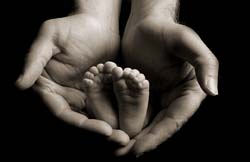Jerry Chan’s Baby Blog — Chapter 6
It’s been almost two weeks since our daughter Marianne was born. Thanks to our yuesao (maternity maid, 月嫂), things at home have settled into a steady routine of feedings, diaper changes, baths and intermittent intervals of sleep. Having someone on hand 24/7 has definitely been a huge help – it’s hard to imagine how even more ragged we’d feel if we hadn’t arranged for someone with experience to assist us at this crucial time.
The job of the yuesao is tied to the idea of zuo yue zi (做月子) – the customary four- to six-week period after birth in which a new mother in China recuperates at home under stringent dietary and health conditions. It is essentially a mixture of old traditions, rudimentary medical knowledge and common sense (with the occasional touch of superstition); I surmise that many of the practices (i.e. no bathing for up to a month, lest mom catch a cold or chill that could affect her for the rest of her life) are holdovers from the old days when diets and living conditions in China were far inferior. But, for the most part, the notion that a new mother needs a set period to rest and heal seems sensible enough.
Since this past Year of the Pig has seen an explosion of new babies born here in China, so too has the business of the hundreds – perhaps even thousands – of yuesao companies (yuesao gongsi, 月嫂公司) here in the capital. The Shanghai Daily reported last year that some yuesao were pulling in monthly salaries of around RMB 6,000 – higher than many white-collar office workers. Here in Beijing, the story is much the same, although we personally haven’t come across any companies charging that much for their yuesao services.
Our own search was done through a series of personal recommendations, newspaper and Internet trawling, as well as on-the-street inspections of flyers and storefronts. We finally settled on a company located near the Lido Hotel. Though I was a bit skeptical at first (how much could a complete stranger in our home really help?), after we went to their office to interview our prospective yuesao, I was soon convinced.
We were told that the various services offered include help with feedings (especially breastfeeding), changing diapers, bathing baby, cooking nutritious meals for mom, washing clothing and linens for both mother and baby, as well as cleaning and sterilizing the umbilical cord area and C-section wound (if applicable) – in other words, the essential tasks of caring for mother and child in the critical first month. The fee is based on the experience of the nanny: The services of younger yuesao usually go for RMB 3,600 a month, while older, more experienced ones go for RMB 4,000 and up. Although I was not expecting a miracle worker, the mere recitation of this list was enough to make me realize just how much work lay in store for us.
We spoke with a fortysomething woman from Inner Mongolia whom we called “Sister Chang” (Zhang Jie). She seemed like a genuinely kindly and patient soul, and interviewed well, so we decided then and there to reserve her services for our first month.
After the interview, the company asked us to notify them soon after the baby was born to set the Sister Chang’s exact start date (which was up to us, and could be as soon as we wanted). Unfortunately, when the baby was born and it came time to call Sister Chang in, we were told that she had taken ill. The company recommended – surprise, surprise – a slightly more expensive yuesao (the RMB 4,000+ kind).
We were willing to give the company the benefit of the doubt – particularly since both my wife and I had also just gotten over rather nasty cases of the flu – and, indeed, after some back-and-forth bickering, we were assigned an alternate nanny at the original RMB 3,600 price. But when our new yuesao showed up at the hospital, things didn’t quite match up to our expectations.
Stay tuned for details in the next chapter…




